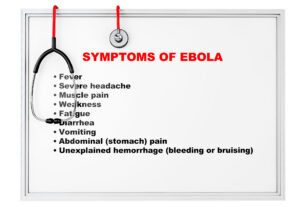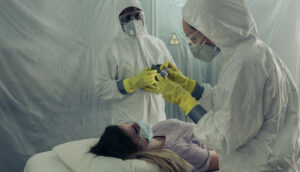“Ebola threatens everything that makes us human” World health Organisation
Ebola virus disease (EVD) is a rare and deadly disease affecting both people and nonhuman primates1. Ebola is a virus which mainly affects sub-Saharan Africa and can infect people through direct contact with an infected animal, such as a bat or a nonhuman primate. Transmission can occur through contact with blood, bodily fluids, contaminated objects (needles, bedding) or infected foods such as fruit1.

Ebola infection results in “dry” symptoms such as fever, aches, pains and fatigue, or “wet” symptoms which include diarrhoea, vomiting or bleeding1. Ebola is a rare but severe disease, with survivors of the infection producing antibodies for up to 10 years after infection1. Treatment involves providing fluids, using a medication, and treating any other conditions as they occur.
In recent days, Uganda has declared an outbreak of the highly contagious Ebola virus2. This outbreak arises from a confirmed case of the relatively rare strain of Ebola Sudan in a 24-year-old male. Since this confirmed case, Ebola has spread more than 50 miles through rural Uganda3. A total of 36 cases have been confirmed, 23 people have died, while many more are suspected to be transmitting this deadly virus. Ebola has a hibernation period of 21 days before symptoms, which means many more infections may not have been detected and could pose a serious threat to the people of Uganda.
This strain of Ebola has not been recorded in Uganda in more than a decade and currently has no approved vaccine. This means that healthcare workers must face much higher risks to help stop this outbreak. The public has been urged to remain vigilant and calm as the Ministry of Health has dispatched teams to enhance surveillance and community awareness of this outbreak4.
DID YOU KNOW? 3-4% of infected patients are health Care Workers!
During an outbreak, healthcare facilities should maintain a log of all persons entering the facility. Consistent standard practices are essential when caring for infected patients.
Healthcare workers should:

Wear protective clothing – including masks, gloves, gowns and eye protection.
- Double glove if heavy-duty gloves are not available. REMEMBER! The use of gloves does not replace the need for cleaning your hands!
- Isolate patients with Ebola from other patients
- Avoid direct contact with the bodies of those who have died from Ebola.
- When de-robing ensure exposed surfaces do not come in contact with your body. Roll gowns in on themselves.
- Healthcare providers should frequently perform hand hygiene before and after:
- All patient contact.
- Contact with potentially infectious material
- Before putting on and upon removal of PPE – including gloves.
EBOLA Patient Room Infection Control
Dedicated medical equipment ( preferably disposable, when possible) should be used for the provision of patient care.
 Disinfection Procedure:
Disinfection Procedure:
- Disinfect with a fresh batch of KK2 solution @2153ppm
- Work from the area furthest from the patient first, towards the patient (or bed)
- Ensure the surface being disinfected is thoroughly wet, ideally, the surface should be wet for 5 minutes
- Dispose of all used paper towels and cloths by incineration where possible
Where cloths cannot be disposed of effectively, soak in a 1000ppm solution for 1 hour before the separated laundry procedure.
Standard safety work practices combined with a robust infection prevention cleaning procedure will help to control the infection within the facility and protect healthcare workers as they strive to save the lives of their patients.
Click here to find out just how effective our NaDCC products are
Click here to contact NaDCC and click here to link with us
© Kersia Healthcare 2022
References 1 Ebola (Ebola Virus Disease) | CDC 2 https://www.dw.com/en/uganda-declares-ebola-outbreak-after-man-dies-of-virus/a-63178911 3 https://www.telegraph.co.uk/global-health/science-and-disease/doctors-scramble-contain-ebola-outbreak-virus-spreads-uganda/ 4 Ebola outbreak declared after Uganda finds rare strain (axios.com)

